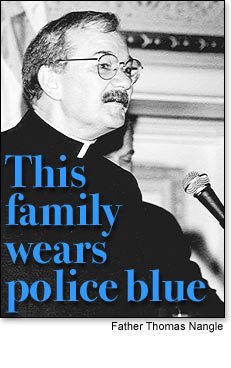 |
 |
|||||
 |
 |
 |
 |
 By Patrick Butler By Patrick ButlerSpecial Contributor When police officer Eric Lee was shot and killed breaking up a fight in the Englewood neighborhood Aug. 19, it began an emotional roller-coaster—not only for his grieving family, but for another family as well. That family wears Chicago police blue—the 13,000-plus men and women who meet crime head-on. And sometimes, like Eric Lee, they die. When they die, or are hurt in other ways, police have spiritual needs. As the Chicago Police Department’s Catholic chaplain for the past 22 years, Father Thomas Nangle has officiated at his share of funerals for slain officers. But the last thing he wants is to be thought of as someone who’s only around for tragedies. “I’m a pastor just like any other,” said Nangle, whose job ranges from distributing ashes at all 25 police district stations at the start of Lent and celebrating special Masses for cops on the second and fourth Sundays of every month at Mercy Home, 1140 W. Jackson Blvd., to counseling troubled officers and their families and visiting hospitalized “parishioners.” Of course, he added, members of Nangle’s current 13,000-plus-congregation pack heat and often “see more heroism and horror in a single shift than most everyone else sees in a lifetime.” When Lee died, there was a parade of police officers offering condolences to the family and saying goodbye to a comrade. That outpouring also was evident at Lee’s funeral. While it’s “sacred work,” the emotional toll can be heavy, Nangle said. That’s also true, he said, when a cop shoots someone in the line of duty. “Taking a life is the most momentous thing you can do. It will shake you up even when you’re completely justified. And it should shake you up. It should shake us all up,” Nangle reminded a reporter a few years ago. Standard procedure is to send a department chaplain to the scene to talk to the officer as soon as a shooting occurs, Nangle explained. At a time when an already stressed-out cop is about to be questioned at length by everyone including a deputy superintendent, “It’s important that he know he has a friend who will listen without passing judgment,” Nangle said. “A police officer is probably the only person it’s still OK to discriminate against. In some people’s minds, the policeman is always wrong. Yet when you hear someone trying to pry open the door on your 82-year-old mother’s house, who do you call,” asked Nangle, who can’t remember a time when he wasn’t “in awe of what street cops do day in and day out.” Like most boys, Nangle grew up dreaming of becoming a cop or fireman himself. “But I also dreamed of becoming a priest,” said Nangle, who was at a barbecue in his first parish when two off-duty Tactical Unit officers told him that if he really wanted to know his new neighborhood, the best way would be from a squad car. “Naturally, I jumped at the chance,” said Nangle, who has since ridden on more patrols than he can remember and attended police-related psychology classes “five or six times” at the FBI Academy in Quantico, Va. Nangle says that while he’s a lot busier now than a few years ago, when he had the help of three deacons and a nun, all police officers who have since retired, he isn’t sure being a cop has changed much since he became a chaplain. “You still have to have a passion for fairness and justice,” said Nangle, recalling a conversation he once had with two detectives who seemed especially determined to solve a back-alley homicide in a high-crime neighborhood. “We may be the only two people in the world who really care about what happened, but we’re going to make sure nobody gets away with murder even here,” one of the detectives explained. “Cops are great philosophers,” who in their quest to learn “the meaning of life,” often start questioning the system and even organized religion, said Nangle. But before any chaplain can work on that, he must first win the officers’ respect, as a person as well as a priest, said Nangle. “If you’re not believable, they’ll be polite, but they won’t take you seriously,” Nangle said, adding “you’ve got to meet them where they’re at, not where you’d like them to be.” Front Page | Digest | Cardinal | Interview |
|||||